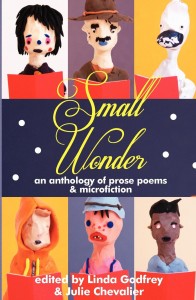
1. What inspired you to write the prose poem/microfiction which is published in Small Wonder?
There’s been much written about love being either romantic or dystopic, or first one and then the other. I wanted to explore the idea of love occurring at the end of a relationship; how trust, quite often, comes in letting go rather than holding on.
2. Tell us about that process. (Do you start sparse and widen out, or do you write down every possible association and cut back? Do you research the subject matter you are writing about? Is it pure intuition?) Take us through an example if you want.
In But what have you done lately? I guess it was pure intuition. I usually write much longer stories. In this case I wanted to distill the emotion of a particularly pivotal experience while still honouring extraneous words, phrases and images that formed the narrative. In point, everything remotely related to the story felt vital in capturing a place, a time, and a series of overarching emotions.
3. What advice do you have for other writers ? about the first or last line? About how to choose the title? Do you follow any rules?
I‘m hesitant to offer any advice to writers other than to trust their own intuition. The craft of writing takes time but can most certainly be developed; a willingness to go deep is more difficult to foster. It relies, first and foremost, on a great deal of emotional honesty with oneself. Writing, in this regard, is both its own punishment and reward as one seeks a greater truth or series of truths.
4. Who or what inspires your writing?
I’m inspired by any writer willing to be vulnerable on the page. While many of these writers are women (Lorrie Moore, Amy Hempel, Miranda July, and Kate Cole-Adams), contemporary male writers such as Sherman Alexie, Etgar Keret, Tom Cho, and Patrick Cullen are also willing to expand upon notions of gender identity rather than relying on stereotypes. By opening up to their own flaws and insecurities, these writers inspire me to do the same. Ultimately, I guess it’s about compassion: a willingness to both read and write with acceptance rather than judgment.
5. Tell us what do you do if you haven’t written anything in a while and you want to get started writing again? Could you share your favourite writing exercise with our readers?
For me the same exercise has fuelled countless stories, and it is, “I remember.” My initial recollection soon morphs into something else: a series of people, places, and feelings I’m unable to forget. From there I’m (thankfully) taken away from my small sense of self into a fictional context. I’m not sure how or why this works; I think it’s because I give myself permission to write without too much evaluation during what’s essentially the creative process. In a way, I’m tricking my inner critic to drop the ball for long enough for me to get a story onto the page. Once that’s done, the critic’s more than happy to guide me through the subsequent redrafts…
Often it’s enough to give yourself permission: to tell yourself that your writing is wanted and appreciated. People will tell you otherwise, that writing is at best a hobby, at worst a distraction. These people have no vision, and while I’m sure they’re lovely, they simply don’t understand what it means to be a writer.
As a writer, you do understand. Write, revise, make mistakes and most importantly, grant yourself both permission and patience to grow on your own terms, at your own pace.
Laurie Steed is a New Zealand born, Australian raised writer, editor and reviewer. He has appeared in various literary journals and is currently completing his PhD in Creative Writing at the University of Western Australia.
You can listen to Laurie reading But what have you done lately? at Spineless Wonders Audio page.
Follow Us:
Share this page:
